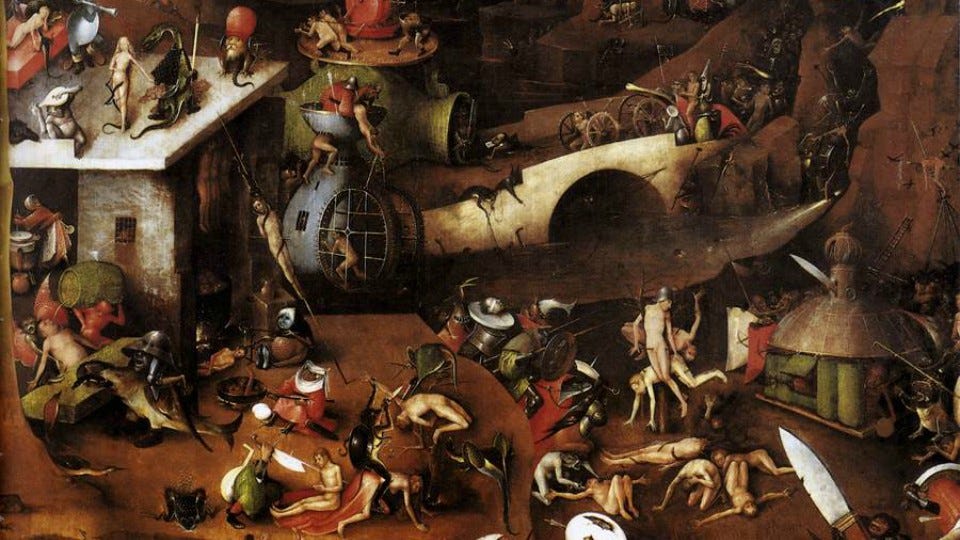Life Stinks
I profit from informing the world about evils being done. But there are days even I can't take it.
The scene outside my window in Washington, D.C.
People tell me I have a sunny personality and that my main fault is a reluctance to imagine that the worst will ever happen. Donald Trump’s second presidency, for instance, is wreaking much more damage than I previously thought possible. But of course that’s good for me. It gives liberal publications like the one I work for a bit of a financial boost, thereby enhancing my job security (which has not, these past 15 years, been terrific for me or any other journalist in my age bracket). It also gives me a hell of a lot to write about. Every morning I wake up and say, “Which fish in this barrel do I shoot today?” I have never felt more useful.
But increasingly I recognize why even my most intelligent and civic-minded friends have difficulty motivating themselves to keep up with the news. I myself have days when, reading the newspaper, I feel overwhelmed by the feeling that the world is an evil place, not just now but since the dawn of man.
Today is one of those days.
1.) For about a decade JP Morgan Chase had ample reason to know, even before he got busted as a sex offender, that Jeffrey Epstein was engaged in illegal activities, yet it avoided doing anything because a.) Epstein had so much goddamned money in its accounts; b.) Epstein brought the bank valuable customers; and c.) Epstein had kompromat on a high-ranking JP Morgan banker who was in line to succeed Jamie Dimon. Dimon claims not to remember being told about Epstein’s many suspicious withdrawals, which turned out to be payoffs to silence his victims. Either he’s lying or (and this strikes me as more plausible) JP Morgan Chase over the years has had so many wealthy and unsavory clients who set internal criminal checks blinking red—yet about whom the bank did nothing—that he can’t be expected to remember all of them.
This is all related in a superb investigative piece in the New York Times Magazine.
2.) The war on cancer has been making great strides over the past two decades, particularly with pediatric cancer. But the Trump administration is shutting it down. Jonathan Mahler investigates (again, in the New York Times Magazine) the example of a particularly promising research project at University of Massachusetts Worcester regarding pediatric brain cancer. People will die as a result—children will die as a result—and the Trump administration can’t articulate a coherent reason for why it’s doing this. This appears to be a case of what Samuel Taylor Coleridge once called “motiveless malignity.”
3.) Throughout the 1970s ghettos throughout the country were set afire, most memorably in the Bronx. The explanation given then, which was depressing enough, was that poverty bred despair and turned aimless youths into sociopaths. But we’ve since learned there was a profit motive: Landlords paid these kids to set their decaying tenements ablaze for the insurance money. Sometimes they even lit the match themselves, in at least one instance donning blackface. Public housing was spared because there was no profit motive, i.e., no possibility of private reimbursement. This is a review by Brian Goldstone of Bench Ansfield’s book Born in Flames in the New York Times Book Review.
4.) The Supreme Court is siding with the Trump administration 84 percent of the time; it sided with the Biden administration only 53 percent of the time. And of course only one of those administrations—Trump’s—is habitually laying waste to the rule of law. This is by Adam Liptak, on Page One of the New York Times. (Liptak doesn’t make this last point but Trump keeps losing in lower courts everywhere except the lunatic Fifth Circuit.)
5.) Gaza.
6.) Defense Secretary Pete Hegseth is threatening to punish any military personnel who do not accept Charlie Kirk as their personal savior, and Deputy Secretary of State Christopher Landau is making the same threat to visa holders.
That’s just the New York Times. I don’t know if I’ll have the strength today to pick up my Washington Post, which I persist in reading daily in spite of its opinion section’s growing fatuity, because its news coverage remains indispensable. But I see George Will is today comparing Kirk to Socrates and I just can’t.
The paradox is that although bad journalism like the beatification of Charlie Kirk makes me feel low, the good journalism like coverage of monstrosities committed by Israel in Gaza and the Supreme Court’s tolerance of autocracy and the Trump administration’s war on cancer research and JP Morgan Chase’s coddling of a sex trafficker make me feel even lower.
Reader, I feel your pain. I will resume adding to it soon. But right now I just can’t.


